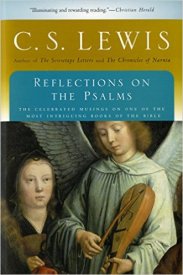What must be said, however, is that the Psalms are poems, and poems intended to be sung: not doctrinal treatises, nor even sermons. Those who talk of reading the Bible “as literature” sometimes mean, I think, reading it without attending to the main thing it is about; like reading Burke with no interest in politics, or reading the Aeneid with no interest in Rome. That seems to me to be nonsense. But there is a saner sense in which the Bible, since it is after all literature, cannot properly be read except as literature; and the different parts of it as the different sorts of literature they are. Most emphatically the Psalms must be read as poems; as lyrics, with all the licences and all the formalities, the hyperboles, the emotional rather than the logical connections, which are proper to lyric poetry. They must be read as poems if they are to be understood; no less than French must be read as French or English as English. Otherwise we shall miss what is in them and think we see what is not. — C. S. Lewis, Reflections on the Psalms
 This is an important point that can be made about any part of the Bible. We must always interpret the Bible in light of the genre of literature it is using to communicate to us. The Psalms, by nature of their poetic genre, remind us that they are not merely meant to be studied and parsed; they are meant to be experienced.
This is an important point that can be made about any part of the Bible. We must always interpret the Bible in light of the genre of literature it is using to communicate to us. The Psalms, by nature of their poetic genre, remind us that they are not merely meant to be studied and parsed; they are meant to be experienced.
That is, when reading the Psalms we need allow ourselves to follow their emotional cues. In Psalm 6, for instance, I must begin not only by recognizing David’s conviction of sin and the emotional pains that brought it, I must join David, allowing the Psalm to convict me of sin to the point that my whole body is in terror and I cry out, “How long, O Lord.” And as I continue through the Psalm, begging for mercy and placing my hope in the faithful love of God, I must allow the Psalm to move me as it did David. I must allow my hope to be restored because, I need to shared in David’s hope that, “The Lord has heard the sound of my weeping, the Lord has heard my plea for help, and the Lord accepts my prayer.”
The Psalms, by virtue of their poetic form, are instructing us that merely understanding the words of the poem is an insufficient form of interpretation. Instead we must strive to enter into the experience of the Psalms, sharing in the fears and hopes, sorrows and joys, and even the conviction and restoration of the Psalmist.
 Meditation fits the soul for supplication. David [in Psalm 5] first mused and then he spoke with his tongue. Nay, to assure us that mediation was the mother which bred and brought forth prayer, he calls the child by the parents name, “Give ear to my word O Lord, consider my meditation.” Meditation is like the charging of a piece and prayer the discharging of it…. Meditation is the best beginning of prayer and prayer is the best conclusion of mediation. — Charles Spurgeon
Meditation fits the soul for supplication. David [in Psalm 5] first mused and then he spoke with his tongue. Nay, to assure us that mediation was the mother which bred and brought forth prayer, he calls the child by the parents name, “Give ear to my word O Lord, consider my meditation.” Meditation is like the charging of a piece and prayer the discharging of it…. Meditation is the best beginning of prayer and prayer is the best conclusion of mediation. — Charles Spurgeon